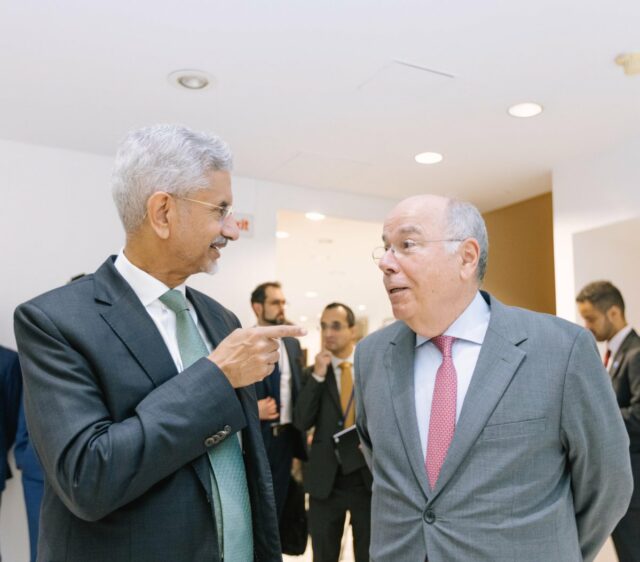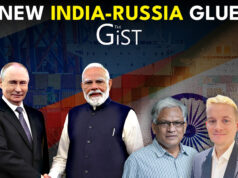Brazil’s Vice-President Geraldo Alckmin has confirmed that President Lula will visit India in February 2026, following Prime Minister Modi’s visit to Brazil in July 2025.
He was hopeful of a direct air route between India and Brasília, calling it a shared goal.
“Connectivity must follow trade,” he said during a media interaction in Delhi. “A direct flight is something we are discussing seriously.”
Oil Cooperation, Energy
Brazil has invited Indian companies to participate in upcoming oil exploration block auctions, Vice President Geraldo Alckmin confirmed during a media interaction in New Delhi.
The invitation is part of a broader effort to deepen cooperation with India in energy security, trade, healthcare, agriculture, and investment.
Sharing key deliverables from his three-day official visit, Alckmin said that Brazil’s National Petroleum Agency will release six oil exploration blocks in the Campos and Santos basins next year, and up to 18 additional blocks may be made available.
“We have invited Indian oil companies to participate in these auctions,” he said.
He also confirmed that Petrobras has signed a contract to supply six million barrels of crude oil to India, and that Brazil continues to import diesel from Indian refiners.
“This is a two-way partnership. We sell oil to India, and we buy refined fuel from India,” Alckmin noted.
A top diplomat later told StratNewsGlobal that “Brazil’s exports of crude to India on the first three quarters of 2025 exceeded $1.13 billion, which represents an increase of 35.5% compared to same period of 2024.”
Alckmin confirmed that both countries, along with the US, are discussing joint efforts under the Global Biofuels Alliance to scale up production of Sustainable Aviation Fuel.
Trade, MERCOSUR
The Vice President noted that bilateral trade is expected to reach $15 billion by the end of 2025, compared to $12 billion in 2024.
“Our goal is to reach $20 billion as soon as possible,” he said.
Alckmin announced that India and Brazil have reached an understanding to expand preferential tariff lines under the India-MERCOSUR trade framework, and that technical negotiations will aim to conclude within 10 months.
“The current agreement covers a small number of products. Expanding it will increase economic complementarity,” he explained.
He also highlighted MERCOSUR’s ongoing negotiations with partners including Singapore, EFTA, Canada, the European Union, and the United Arab Emirates, noting that Bolivia has now joined MERCOSUR as its fifth full member.
Investment Facilitation, E Visas
Alckmin confirmed the signing of two new deals: an Investment Facilitation Agreement to support bilateral business growth; and a Double Taxation Avoidance Agreement to enhance legal and financial certainty for investors.
“These agreements give legal security to businesses from both sides,” he said.
He also announced that starting next week, electronic business visas will be issued by the Brazilian Embassy in New Delhi and the Consulate in Mumbai.
“This will make business travel much easier for Indian professionals and consultants,” he said.
Agriculture, Food Security
Responding to a question on food security, Alckmin pointed out that Brazil’s agriculture sector grew by 16% this year, and that there is strong complementarity with India in areas like fertilizer trade and agribusiness innovation.
“India is the largest food producer. We import large amounts of fertilizer and have deep expertise in agri-business. Our economies do not compete, they complement each other,” he said. He also noted that 80% of Brazil’s cattle herd is of Indian origin.
Healthcare, Pharma
Brazil is looking to deepen its engagement with India’s pharmaceutical industry to support its universal healthcare system.
“There is great interest in Indian drug products,” he said, and confirmed an agreement between Fiocruz (Brazil) and Biological E (India) for vaccine co-development and technology transfer.
BRICS, Strategic Alignment
On global trade tensions and BRICS positioning, Alckmin clarified: “BRICS is not against anyone. It is in favour of multilateralism and free trade.”
He also said both Brazil and India are large democracies with shared values, and added that amid changing global trade dynamics, India and Brazil can serve as reliable partners for each other, especially in agriculture, technology, and industrial growth.





